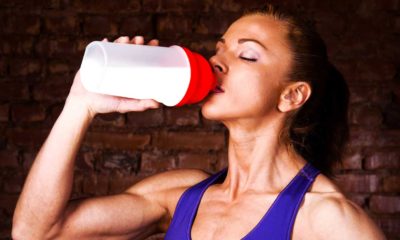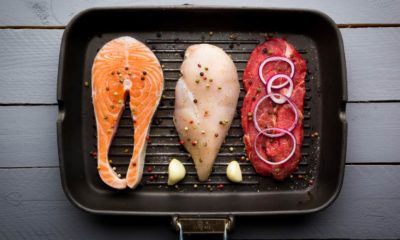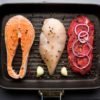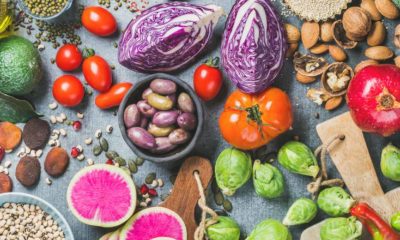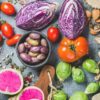Nutrition
How To Get Protein As A Vegan
As more research emerges warning us of the harmful effects of consuming animal products, plant based diets are becoming increasingly popular. In addition, moral and ethical practices for “humane” slaughter of factory animals has also been raised in question.
However, for those who are thinking of becoming vegan, there is a common misconception about plant protein is that you’ll develop a deficiency from incomplete proteins. If you eat a variety of nutrient-rich, whole foods, your body will store what it needs to function optimally in regards to essential amino acids.
Nearly all whole foods (including greens and veggies) contain protein, and nearly all forms of protein contain all protein-forming amino acids in some quantity.
Also, your body doesn’t prefer protein from steak over protein from tofu. Consider a 400lb gorilla with a strong muscular body. What is their source of protein? What do they eat to grow? The answer is leaves, stems, roots, seeds and fruit. If a gorilla can survive solely on plants our bodies are capable of doing the same.
Here are 10 really great sources of protein dense foods:
1. Lentils
Found in a variety of colors and part of the legume family. One cup of cooked lentils has 18g of protein and 16g of fiber. The protein and fiber in lentils are also linked to better blood sugar control, lower blood pressure and cholesterol, reduced risk of heart disease and colon cancer.
Lentils are super versatile and go well in salads, sandwich wraps, veggie burgers, soups, stews/curry dishes, hummus, or as a side dish.
2. Quinoa
Often thought to be a whole grain but, is actually a seed. One cup of cooked quinoa contains 8g of protein. It’s also gluten-free so a good choice for people who are allergic to wheat.
Quinoa goes well into green salads, stir fry, sandwich wraps, or used as a substitute for rice in any dish.
3. Seeds Hemp
They contain heart-healthy fats, mainly omega-3 fatty acids. Three tablespoons of hemp have about 10g protein. You can add hemp to smoothies, in soups/stews, or even bake into your meals/desserts
4. Chia seeds
Chia seeds absorb water and turn into a gelatinous substance which is why they are great for constipation are pure fiber! Along with omega 3’s and 4g protein per two tablespoons, they make a great addition to oatmeal and smoothies.
5. Spirulina
One of the few sources of plant-based protein that is mostly protein by dry weight – about 70%! Two tablespoons contain 8g of protein, so mix some into a glass of juice, or in a smoothie.
– RELATED: A Beginner’s Guide To Protein –
6. Nutritional yeast
A staple food item in plant-based diets because of its versatility, high amounts of B vitamins, and protein content. Nutritional yeast contains no dairy or active yeast, and is found in a powder/flake form which becomes a paste when mixed with liquid. It’s great for making dairy-free sauces and dressings. Three tablespoons contain 12g of protein.
7. Beans
All beans ranging from black beans to garbanzo beans are a great source of protein with 12-18g per cup. They’re also high in fiber, magnesium, and iron which makes them another versatile option for a meat substitute in burgers.
8. Ezekiel bread
It contains all of the essential amino acids and contains 8g protein per two slice serving. It’s usually made from sprouted grains, a process which increases the bread’s fiber and vitamin content, as well as its digestibility.
9. Soy
•Tempeh 15g per 1/2 cup
•Organic tofu 10g per 1/2 cup,
•Edamame 17g per 1 cup
These are all complete protein sources containing all amino acids. These sources also carry fiber and healthy fats as well as protein.
10. Organic plant based protein powder
There are several great tasting supplemental plant proteins, however, I recommend Garden of Life organic meal. It goes great with almond milk or water and it contains 20g protein per scoop!
You can also it incorporate veggie patties, burgers, protein bars, and cereals – especially puffed Kamut which contains 6g protein per cup for only 100 calories.
All of the small changes with choosing the right protein rich plant foods will add up. You may find you actually have no problem getting in protein at all. In fact, you might reap a few health benefits of straying from meat products and jumping into more of a plant based diet as well as aligning your food choices with your personal moral compass.
For more nutritional information straight to your inbox, sign up to the TRAIN for HER newsletter.





